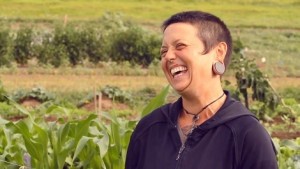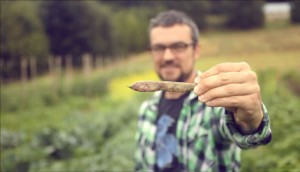Podcast: Download (Duration: 5:37 — 7.7MB)
There’s the road you travel, there’s the “road not taken,” as so eloquently written about by poet Robert Frost, and in Clark County there is also the road that takes you straight into the dirt. It’s the new Roots to Road program.The pilot program, developed by Partners in Careers, in collaboration with Clark County, used small-scale farming to teach veterans marketable job skills. The result was an acre of organic produce and three Clark County vets who — while gardening — reclaimed their own road to a different life.
Partners in Careers’ executive director Pam Brokaw created the concept with Clark County Heritage Farm on 78th Street in Hazel Dell. It is a public site the county sought to use for demonstration projects, and it became a perfect fit to help homeless vets acquire skills that would transition them back into the work force.“We just wanted them (veterans) to be able to come out with a variety of different skills, so that we could help place them into employment,” says Brokaw. “It was a comprehensive approach that we wanted to take, and it was something new.”
Program organizers quickly realized that they couldn’t do it without somebody on site to work with the veterans. Erika Johnson took charge and coordinated the first six months of the pilot program.
“I’m just really impressed with what three non-farmers have been able to do,” says Johnson.
The gardeners she supervised were local vets who had faced homelessness, had significant barriers to finding employment, and who had stumbled over other life obstacles including alcohol and substance abuse. Two of the vets were thirty-something, one over 50 — the age where bending, weeding and harvesting creates its own set up obstacles.
Their work week started on Monday in a classroom where they learned methods of growing organically. The remainder of the week unfolded as applied science – weed, plant, check for pests, repeat. Their grassy plot was tamed, tilled and tended, and as it grew they traveled a path toward a healthier lifestyle.
Dee Rogers sports short cropped hair, gaged ears and intertwining tattoos, and speaks of a “rough patch of years” that included the death of her mother, homelessness, wandering the country, and struggling with a drinking problem. The Roots to Road experience helped her “find more of a purpose” and skills she could use in a “job atmosphere.”
Today she has healthy concerns about food and choices.
“Kids should know where their food is coming from, and I really never thought about that when I was younger. You should want to eat good food, and you should want to take care of yourself.”
Disabled veteran Ben Hines smiles broadly when he speaks of how it altered his course, including cutting back on traditional fast food.
“It’s been a real lifestyle change to come and eat fresh,” says Hines.
Whether he farms professionally or not, Hines has learned a life skill that he didn’t have before. He’s also flooding the community with his gardening enthusiasm. Four of his friends, who last year, at most, merely mowed the lawn, this year got out and grew a garden, too. It’s also changed his family.
“If I bring produce home from the grocery store – it’s not so cool or something. But I bring it home, and it still has dirt on it, wash it off, that kind of stuff, and my little kids are excited to have fresh produce and that’s kind of exciting.”
It also altered Hines’ career path. “I was seeing some counselors through the VA. It was random, I was looking for a job, going to school and I thought this project would be fun. I was originally getting a job in medical records – how boring.” This opportunity offered Hines something he thrived on. “It’s an amazing thing to come out here and garden.”
Veteran Donna Cory has always preferred jobs that took her outdoors. For many years, she fought fires and was a wilderness ranger. The last five years, she took a stab at working indoors, but it wasn’t a good fit. Participating in the pilot project brought her full circle, back to the fresh air she loves, which doesn’t mean the work is easy.
“A farmer never sleeps; now I believe it. There’s never a day off, never. There’s always something to do.”
Rogers agrees the work is hard, but it nourishes. “I have so much respect for the amount of work that goes into all of this. And it’s so satisfying when you grow something and you eat it. I can’t think of something more satisfying.”
Ben Hines sees no end in sight. “I’m going to garden probably forever now.”
CREDITS
Video shot and edited by Miles Burnett and Jordan Thompson
Audio captured by Evan Newman
For more info:
Partners in Careers | Self-sufficiency through specialized job training
3210 NE 52nd St.
Vancouver 98663
360-696-8417
www.partnersincareers.org/
And more stories about veterans here.












